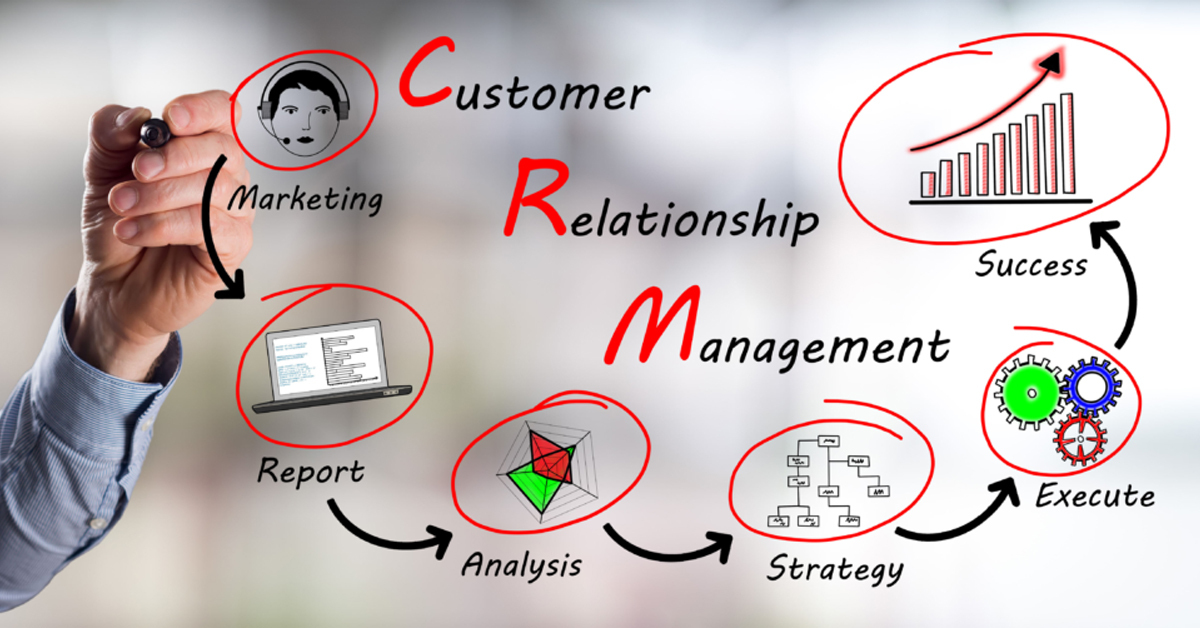The Role Of Customer Relationship Management (CRM) Software:
Effective CRM (customer relationship management) has become increasingly important to business success in today’s dynamic business environment. To effectively manage interactions with clients and streamline different company procedures, many organisations are now depending on CRM software. This blog post will examine the various functions of software for customer relationship management, from its core capabilities to best practices.
Knowledge of CRM Software
Let’s establish an overview about what CRM software entails before getting into the specifics. Customer relationship management software is a potent tool that has been carefully designed to help businesses manage their interactions and relationships with clients, customers, and potential customers. A crucial building block for making informed decisions and raising general customer satisfaction, it serves as a central hub for effectively collecting, organising, and reviewing customer data.
Specifications of CRM Systems
The core of CRM software consists of a wide range of characteristics that have been thoughtfully designed to streamline customer-centric procedures and provide invaluable insights into customer behaviour. Among the crucial traits of CRM systems are:
Contact management: CRM software makes it easier to store and manage customer contact information whereas ensuring timely updates.
Sales teams can handle leads more efficiently, keep track of opportunities, and speed up deal closings by integrating sales automation features into CRM systems.
CRM software equips marketing teams with the tools they need to design targeted campaigns, automate marketing via email activities, and continuously track campaign performance.
Streamlined Processes:
CRM software includes built-in automation features that automate a variety of business processes, cutting down on manual work and freeing up valuable time.
The CRM The implementation Process: For any organisation, putting CRM software into use is a major accomplishment. Usually, this project entails a number of crucial actions:
Planning and Evaluation: To align the CRM program with your objectives, start by evaluating the needs and goals of your organisation.
Consider factors like scaling, features, and ease of use when selecting a CRM software that best meets your needs.
Customization: To ensure seamless integration, mould the CRM system to the unique processes and workflows of your company.
Keeping data integrity and precision while migrating existing client information into the CRM system.
Training: Make sure your team is competent in using the customer relationship management (CRM) program by giving them in-depth training.
Rolling out the CRM program gradually will allow for testing:
By following these steps, organisations can successfully implement CRM software to enhance customer relationships, streamline operations, and drive growth.
Assessment: Organisations need to evaluate their specific needs and objectives concerning CRM implementation.
Vendor Selection: The research and selection of an appropriate CRM software vendor aligned with the organisation’s requirements.
Data Migration: The seamless transfer of existing customer data into the CRM system, with a sharp focus on data integrity.
Customization: Adapting the CRM software to harmonise with the organisation’s workflows and processes.
User Training: Furnishing comprehensive training to employees to ensure adept utilisation of the CRM system.
Integration: The integration of CRM software with other vital business tools and systems.
Testing: A thorough evaluation of the CRM system to identify and rectify any issues before full-scale deployment.
Deployment: The orchestrated rollout of CRM software throughout the organisation, ensuring that all users are effectively onboarded.
CRM Data Management:
Effective data management lies at the epicentre of a successful CRM implementation. Businesses must diligently maintain clean and accurate data to extract meaningful insights and deliver top-tier customer service. Critical aspects of CRM data management encompass:
Regular Data Cleansing: The systematic removal of duplicates and inaccuracies from the data repository.
Data Security Measures: Implementation of robust security protocols to safeguard customer information.
Data Segmentation: The segmentation of data to facilitate targeted marketing and communication strategies.
Data Integration: The convergence of data from various sources into a centralised repository for comprehensive information access.
CRM Integration Solutions:
The effectiveness of CRM software is maximised when it is seamlessly integrated with other tools and systems employed by the organisation. Common integrations include:
Email Marketing Platforms: Integration with platforms like MailChimp and Constant Contact for enhanced marketing campaigns.
Sales and Marketing Automation Tools: Synchronisation with automation tools to streamline sales and marketing efforts.
E-commerce Platforms: Integration with platforms such as Shopify and WooCommerce for efficient order management.
Customer Support Software: Integration with customer support solutions like Zendesk and Freshdesk for a cohesive support experience.
Accounting and Invoicing Software: Synchronisation with accounting and invoicing systems for financial management.
Integration ensures the unhindered flow of data between systems, bolstering overall efficiency and furnishing a comprehensive view of customer interactions.
CRM for Small Businesses:
Small businesses stand to gain immensely from CRM software, as it equips them to compete effectively with larger counterparts by:
Centralising Customer Data: Offering a consolidated repository for valuable insights.
Automating Sales and Marketing: Streamlining processes for improved efficiency.
Personalised Customer Experience: Enabling the delivery of customised experiences.
Boosting Sales and Revenue: Optimising lead management for increased sales and revenue.
CRM for Sales and Marketing:
CRM software plays a pivotal role in harmonising the efforts of sales and marketing teams, fostering:
Lead Tracking and Nurturing: The systematic monitoring and nurturing of leads for conversion.
Targeted Marketing Campaigns: Crafting campaigns grounded in customer behaviour data.
Access to Marketing Insights: Empowering sales teams with valuable marketing insights.
Enhanced Collaboration: Encouraging fluid collaboration between the marketing and sales teams.
Options for CRM Customization:
CRM software recognizes the variety of company requirements by providing a wide range of customization options, including:
Including custom fields: Including fields designed to collect particular data.
Customising reporting tools to meet specific needs by creating reports and dashboards that are unique to the user.
Changing the rules for workflow automation: automating in a precise way to fit various workflows.
Adaptation to Sector-Specific Tools: integration with tools that are appropriate for particular industries.
Analytics and Reporting for CRM:
Analytics and reporting features within CRM software serve as invaluable tools, providing insights into customer behaviour, sales performance, and marketing efficacy. These insights empower businesses to make informed, data-driven decisions and refine their strategies.
CRM Customer Support Features
CRM software enriches customer service by incorporating features designed to manage customer inquiries and issues, including:
Ticketing Systems: Efficiently managing customer inquiries and support requests.
Knowledge Bases: Providing self-service options for customers.
Tracking Customer Interactions: Keeping a comprehensive record of customer interactions and previous support requests.
CRM for E-commerce
E-commerce enterprises stand to gain significant advantages from CRM software, as it aids in:
Order and Purchase Management: Managing customer orders and purchase histories effectively.
Personalised Shopping Experiences: Delivering tailor-made shopping experiences to customers.
Targeted Email Marketing: Running precise email marketing campaigns for customer engagement.
Optimising Product Offerings: Analysing customer shopping behaviour to enhance product offerings.
User Training for CRM:
A crucial element for maximising the advantages of CRM software is user training. The following topics should be covered in depth training: Using the CRM Interface: ensuring that users are adept at using the system.
Conclusion:
Businesses of all sizes and in all sectors can gain a lot from customer relationship management, or CRM, software. These benefits include improved customer service, stronger client relationships, increased sales productivity, more successful marketing initiatives, efficient information handling, and simplified processes. The adoption of CRM software marks a turning point for organisations with crucial steps such as assessment, planning, software selection, individualization, data transfers, training, and ongoing optimization.
FAQs
Q1. What does CRM software do and why is it important for businesses?
A1. CRM software, also known as relationship management software, is a technological tool that aids businesses in managing their connections and relationships with clients, customers, and potential leads. Because it may organise customer data, enhance relationships with clients, streamline processes, and maybe increase sales and revenue, businesses should take into account its significance.
Q2. How Does CRM Software Help Small Businesses?
A2. CRM software has many benefits for small businesses, including better client organisation data, automated sales processes, increased marketing efficiency, and the ability to generate customised customer experiences. These advantages enable small businesses to contend effectively with more powerful rivals and expand their customer base.
Q3.What Should You Look for in a CRM Software?
A3.It’s crucial to take into account features like contact management, marketing and sales robotics, powerful analytics and reporting, assistance tools, modification flexibility, and easy integration with other crucial business systems and resources when evaluating CRM software.
Q4.What Role Does CRM Data Administration Play and Why Is It Critical?
A4. The maintenance of accurate, complete, and current information about customers within the customer relationship management (CR is at the centre of the CRM data management process. Its importance cannot be overstated because accurate data enables businesses to make informed decisions, provide customised experiences, and avoid problems brought on by outdated or redundant information.
Q5.What Steps Make Up the Typical CRM Software Implementation Process in a Business?
A5.Initial analysis, vendor selection, careful data migration, system modification to align with specific workflows, thorough user training, cooperation with existing systems, thorough testing, and finally the seamless installation across the organisation are all essential steps in the standard customer relationship management implementation method. To ensure that there is no disruption to the CRM system, each step is crucial.
Q6.Can CRM Systems Change to Meet the Special Needs of a Business?
A6.Undoubtedly, the majority for CRM solutions provide a wide range of customization options designed to meet the unique needs as well as operational workflows of a business. Due to the flexibility of CRM systems, businesses can customise the system in a number of ways, from creating unique reports to integrating custom data fields to adjusting automation rules.
Q7.What Are Some of the Most Recent CRM Software Trends and Innovations?
A7.CRM software is currently going through a variety of notable trends and cutting-edge developments. These include integrating sophisticated mapping journeys and customization features, utilising machine learning (ML) and artificial neural networks (AI) algorithms for forecasting purposes, and introducing mobile CRM uses to facilitate







